 MyDogBreeds
MyDogBreeds Ryukyu Inu is originated from Japan but Bordoodle is originated from United States. Both Ryukyu Inu and Bordoodle are having almost same height. Both Ryukyu Inu and Bordoodle are having almost same weight. Ryukyu Inu may live 3 years less than Bordoodle. Both Ryukyu Inu and Bordoodle has almost same litter size. Both Ryukyu Inu and Bordoodle requires Low maintenance.
Ryukyu Inu is originated from Japan but Bordoodle is originated from United States. Both Ryukyu Inu and Bordoodle are having almost same height. Both Ryukyu Inu and Bordoodle are having almost same weight. Ryukyu Inu may live 3 years less than Bordoodle. Both Ryukyu Inu and Bordoodle has almost same litter size. Both Ryukyu Inu and Bordoodle requires Low maintenance.
 The Ryukyu Inu is a medium-sized dog that comes from Okinawa, Japan.
The Ryukyu Inu is a medium-sized dog that comes from Okinawa, Japan.
It’s a dog that is fairly rare having been used to track boar. There isn’t much information on the dog’s history but after its numbers declined after World War II, there was an urge in the 1980s to save the breed.
The dog isn’t recognized by any major Kennel Clubs.
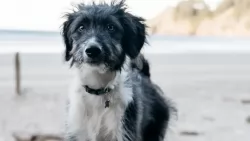 Known also as a Borderpoo or Borderdoodle, the Bordoodle is a designer- or hybrid breed which hails from the United States of America.
Known also as a Borderpoo or Borderdoodle, the Bordoodle is a designer- or hybrid breed which hails from the United States of America.
Both the dogs used in the development of this cross-breed are the Poodle and the Border Collie, and both these dog breeds have their own lengthy histories.
The history of the Bordoodle is short, as it is a modern crossbreed which has been purposefully bred by breeders to bring about a dog with certain looks and temperament.
 Japanese dog breeds end with the word ‘Inu’ or ‘Ken’ . It means ‘dog’.
Japanese dog breeds end with the word ‘Inu’ or ‘Ken’ . It means ‘dog’.
The medium sized Ryukyu Inu stands at between 46 to 50cm in height and weighs between 15 to 25kg. He has a black nose, dark brown eyes and erect ears. The tail is long and curls over the back.
The dog’s coat is short and you get the single- and double coated varieties. The coat can be brindle, red, white, liver or black. Some of the dogs have tiger-like stripes in the coat. People are amazed at these dogs as they have incredible climbing abilities and are even capable of climbing a tree.
These dogs are quiet, unobtrusive dogs. The Ryukyu Inu looks very much like a wild dog, which gives the impression of being un-trainable and ferocious but they are easily trained and make splendid pets.
Many people who have had them as pets say they would choose this dog over and over again. They are brave too and get on well with children or pets in the home. They don’t look for trouble, and their kind, stable natures make them excellent therapy dogs.
They’re intelligent dogs and will require plenty of mental and physical stimulation. They will also need to be trained and socialized as they are confident, strong-willed dogs who might not obey you if left to do what they want.
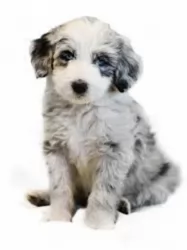 The Bordoodle isn’t a purebred dog but is a cross between a Poodle and a Border Collie.
The Bordoodle isn’t a purebred dog but is a cross between a Poodle and a Border Collie.
He has a soft, medium length coat which is inclined to be wavy. Colors are essentially black and white but chocolate, cream, fawn, merle and grey are also seen.
He is a medium sized dog standing at between 38cm and 55cm and weighing between 13kg and 27kg. The long tail is feathery, the ears floppy or semi-erect and the brown eyes are bright and intelligent. The muzzle is medium to long.
As with any mixed breed dog, the Bordoodle can take after either parent dog but generally the Borderdoodle will be a medium sized dog.
With the Bordoodle you can expect nothing less than a highly intelligent dog. That is because both the Poodle and the Border Collie are super intelligent dogs so the Bordoodle is guaranteed to have got a good portion of this intelligence from both breeds.
It makes training and socialization easy for the dog. It is important for your Bordoodle to be trained and socialized if you want him to be obedient and relaxed around strangers and other pets. As it is, his amicable nature makes the hybrid dog of yours a great family pet – getting on well with other pets in the home as well as with children.
Apart from being such a smart dog, the Bordoodle is active, playful, loving and devoted – everything a serious dog owner wants in a pet. This is a dog that doesn’t really know the meaning of the word aggressive.
 This dog has always been a hunting dog so he will want to have his fair share of good exercise – long walks as well as ball and rope games.
This dog has always been a hunting dog so he will want to have his fair share of good exercise – long walks as well as ball and rope games.
He makes a splendid pet because he has an amicable nature wanting to please. He is quiet, loving and loyal, and with such a dog in your home and heart, you just keep discovering what a wonderful pet this 4-legged friend can be.
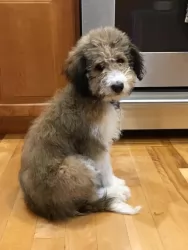 Bordoodles have two great dog breeds to thank for the way they turn out. When you think of the Border Collie and Poodle, you know you’re going to get a dog that is friendly, social, playful, loving and devoted – the ideal family pet.
Bordoodles have two great dog breeds to thank for the way they turn out. When you think of the Border Collie and Poodle, you know you’re going to get a dog that is friendly, social, playful, loving and devoted – the ideal family pet.
Intelligent, he is easy to train too, and with excellent care, you’re going to have a most wonderful family pet and companion, full of fun and life.
 These Japanese dogs are thought to be fairly healthy dogs, but like with most other dogs, you would need to be aware of hip dysplasia, bloat, caner and hypothyroidism.
These Japanese dogs are thought to be fairly healthy dogs, but like with most other dogs, you would need to be aware of hip dysplasia, bloat, caner and hypothyroidism.
The Ryukyu Inu, with its 10 to 12 years lifespan, will be prone to minor ailments, but with good care he is not likely to succumb to any of them.
Cataracts have a number of causes in dogs. This disease of the eye can occur at any age, and can develop over weeks or even years.
Cataracts can occur in just one eye or both eyes and a disease such as diabetes can bring on a cataract.
Good nutrition is important for a dog to build a strong immune system, and nutritional supplementation can certainly help to enhance lens health. Cataract surgery can be performed to remove the cataracts.
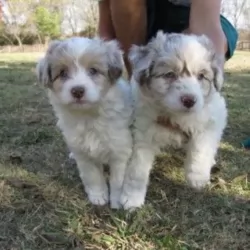 Bordoodles, when well cared for, can live to be 12-15 years of age. There aren’t going to be many health issues to contend with with your Bordoodle as there are no known health problems in this robust breed.
Bordoodles, when well cared for, can live to be 12-15 years of age. There aren’t going to be many health issues to contend with with your Bordoodle as there are no known health problems in this robust breed.
Nonetheless there are some common dog illnesses that you need to be aware of such as progressive retinal atrophy, hip dysplasia and hypothyroidism.
With hypothyroidism, the thyroid gland in the neck of your pet produces a hormone known as thyroxine that controls metabolism, but the disease hypothyroidism makes it that the gland doesn’t make enough thyroxine. Signs that your dog has this illness includes a dull coat, inflamed skin and even hair loss.
Get him to the vet immediately who will do blood tests and provide treatment. Mercifully it isn’t something that is life-threatening.
 The coat of the Ryukya Inu requires brushing twice a week to remove loose hairs. At the same time check your dog over for new lumps and check inside his mouth for bad teeth. Bad teeth can cause lots of pain and toxins within the body. You can also choose to have the teeth seen to and cleaned by your vet.
The coat of the Ryukya Inu requires brushing twice a week to remove loose hairs. At the same time check your dog over for new lumps and check inside his mouth for bad teeth. Bad teeth can cause lots of pain and toxins within the body. You can also choose to have the teeth seen to and cleaned by your vet.
Provide him with his own warm, dry place to sleep.
Provide him with top quality food. There are some excellent commercially manufactured foods on the market that make a point of ensuring good ingredients in them. Your Ryukya Inu needs good food to ensure longevity and health.
Try to include some home-made food for him which can be simply mixed into the dry kibble twice a week. Boiled chicken, brown rice or pasta and spinach, sweet potatoes and carrots is super tasty and nutritious. This food can all be chopped up, refrigerated and added warmed up and in small portions to your pets dry kibble once or twice a week. Your dog will love it.
Ensure there is always a bowl of fresh, cool water within his reach.
Have him neutered or spayed if you aren’t wanting puppies.
Keep his vaccines up to date against some deadly canine diseases.
Get him to the vet when he is injured, in pain or sick.
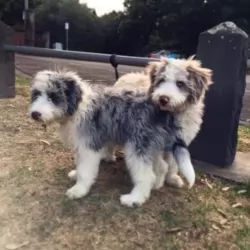 The Bordoodle is a dog which doesn’t shed that much so his grooming requirements are low and he is considered as a hypoallergenic dog.
The Bordoodle is a dog which doesn’t shed that much so his grooming requirements are low and he is considered as a hypoallergenic dog.
He will need to have his coat brushed at least twice a week to keep it shiny, soft and smooth. Depending on how your Bordoodle turns out, he may even require trimming at a professional groomer.
Make time to check his ears inside and out and learn how to clean the inside of his ears to avoid infection and wax build-up.
Dental hygiene is also imperative in dogs, and neglecting to do this will mean food particles and bacteria accumulating along your pet’s gumline, resulting in gingivitis and periodontal disease.
Every dog will require regular exercise and you can get your Bordoodle to join you in your walks. He is the kind of dog that can happily adjust to city or country life, but he will still need to have some ball games and other activities to keep him busy and happy.
He isn’t a dog that can be left alone day after day in the backyard. He is social and playful and loves the companionship of his human family.
If you feed your Bordoodle kibble from some of the top quality commercially produced foods, always research the dog food and take a good look at the ingredients.
The pet food you choose plays an important role in the longevity of your pet. There are commercially manufactured foods that have such poor ingredients that they can actually shorten your pet’s lifespan and cause stress to the kidneys and liver.
If in any doubt about what to feed your Bordoodle, speak to your vet. Cooked brown rice, cooked vegetables and cooked chicken can sometimes be mixed into your pet’s kibble. Raw meat should also occasionally be added in to ward off skin allergies.